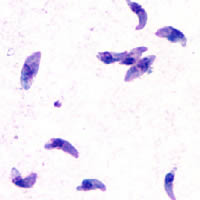
Photo from wikipedia
Background Increasing evidence has shown that circular RNAs (circRNAs) are involved in neurodegenerative disorders, but their roles in neurological toxoplasmosis are yet to know. This study examined miRNA and circRNA… Click to show full abstract
Background Increasing evidence has shown that circular RNAs (circRNAs) are involved in neurodegenerative disorders, but their roles in neurological toxoplasmosis are yet to know. This study examined miRNA and circRNA expressions in mouse brain following oral infection with T. gondii Pru strain. Results Total RNA extracted from acutely infected (11 days post infection (DPI)), chronically infected (35 DPI) and uninfected mouse brain samples were subjected to genome-wide small RNA sequencing. In the acutely infected mice, 9 circRNAs and 20 miRNAs were upregulated, whereas 67 circRNAs and 28 miRNAs were downregulated. In the chronically infected mice, 2 circRNAs and 42 miRNAs were upregulated, whereas 1 circRNA and 29 miRNAs were downregulated. Gene ontology analysis predicted that the host genes that produced the dysregulated circRNAs in the acutely infected brain were primarily involved in response to stimulus and ion binding activities. Furthermore, predictive interaction networks of circRNA-miRNA and miRNA-mRNA were constructed based on genome-wide transcriptome sequencing and computational analyses, which might suggest the putative functions of miRNAs and circRNAs as a large class of post-transcriptional regulators. Conclusions These findings will shed light on circRNA-miRNA interactions during the pathogenesis of toxoplasmosis, and they will lay solid foundation for studying the potential regulation roles of miRNAs and circRNAs in T. gondii induced pathogenesis.
Journal Title: BMC Genomics
Year Published: 2020
Link to full text (if available)
Share on Social Media: Sign Up to like & get
recommendations!